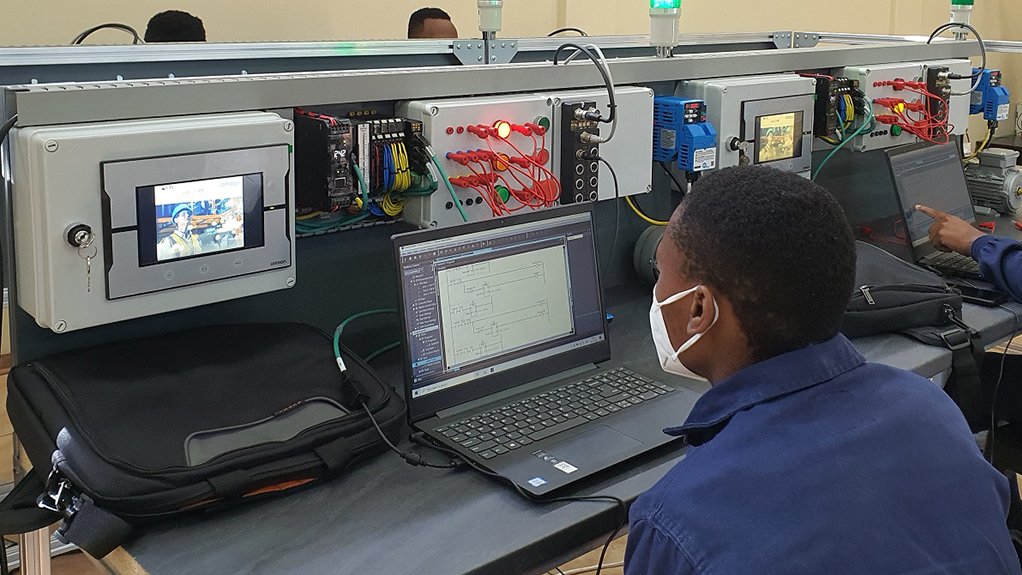Opportunities to improve artisan programme despite slow start



JOHAN VENTER All employers, regardless of industry, are at various stages of digitalization; and those that are further down the road of digitalization are showing more interest
ACCOMODATING DISTANCE LEARNING CTC has trained many of its trainers to become digital educators, and has started to make some of its material available online
While the Artisan 4.0 programme is still in its first year, there are various opportunities to improve the programme going forward, says industry education entity the Colliery Training College (CTC) MD Johan Venter.
CTC introduced the Artisan 4.0 programme last year in four phases, as the programme is focused on learning and working online.
“There will definitely be changes and improvements going forward, but these will be dictated by requirements from customers. Some additions may be the requirements of miners, but that will probably be a separate intervention to cater for miners working in a more digitalised environment.”
Phase 1 is free and was made available to artisan learners last September, while Phase 2 is a paid module and has been available online since last November.
Phase 3 includes a ten-day workshop that is hosted physically at CTC’s premises in Emalahleni, Mpumalanga. During this phase, practical aspects of artisan work in a digital world of work are practised.
Phase 4 then requires a capstone report from learners, where practical applications of training were demonstrated at a worksite.
Venter stresses that the Covid-19 pandemic has made employers reluctant to recruit new members and send existing employees to institutions, such as CTC, for training, owing to the fear of their contracting and spreading the virus.
To mitigate this reluctance, CTC has trained many of its trainers to become digital educators.
Some employers have asked for a mobile CTC unit to visit their sites to conduct training. Venter notes that CTC will explore introducing a mobile unit as the “programme gains more momentum”.
Meanwhile, CTC has started to make some of its training material available online.
“One has to appreciate that our subjects are physical, but by going online, we can at least support some of our distance learners by providing online material. What I would like to see in the future is a reduction of face-to-face learning by about 20% to 30%. Whenever new training courses are considered, they will definitely have online content. Much of our Artisan 4.0 is offered online successfully.”
Venter emphasises that there have been minimal challenges in physically hosting these workshops, as CTC has accommodated learners who have travelled from long distances in hostels or guesthouses.
To date, CTC has hosted three ten-day workshops as a part of Phase 3 of the Artisan 4.0 programme, not all of which have been fully booked.
“Lower numbers have resulted in lower profits for us. We have limited workstations for the third phase of the programme, but we will expand them as more learners generate more income.”
Venter adds that there are also significant opportunities to collaborate with other training providers to deliver Phase 3 workshop training in other African countries in the future.
“Digitalisation is not only happening in South Africa. Africa is probably bristling with Fourth Industrial Revolution (4IR) installations. If training providers in other African countries want to install the Phase 3 equipment in their countries, we can train their trainers at CTC to offer training at their sites to our specifications. We’ll be able to keep an eye on the quality of the training through remote assessment strategies.”
He states that this will give CTC access to the African market, and that other CTC educational programmes may be marketed with the Artisan 4.0 programme.
YES Initiative Support
In support of the Youth Employment Service (YES) programme, CTC has supported 16 learners a year over the past two years for the programme. These learners are placed in artisan and mining training sections at CTC.
Venter confirms that CTC has supported these learners by paying them prescribed industry rates, providing them with training in the normal artisan and mining trades, and exposing them to employers for permanent employment.
“In addition to learning opportunities, we have physical work opportunities as well. At a training centre of our size, equipment needs to be fixed and constructed often. We then make them available to employers for on-the-job training so that they can eventually qualify.”
For example, CTC used some learners to build the Artisan 4.0 training laboratory. This enabled them to complete experiential learning modules, which is part of their training to complete a national diploma.
These modules include Electrical Engineering Practice II (P2), which can be enrolled for after they had passed Engineering Practice I (P1), which, in turn, is part of CTC’s basic and advanced artisan training.
Differentiating between involvement in the YES programme and the Artisan 4.0 programme, Venter explains that YES learners are regarded as CTC employees for 12 months, while learners in other programmes are employees of CTC customers or self-paying members of the public.
“Learners who have been part of the programme have found their employment prospects increasing. Our best opportunities are to provide artisans, miners and engineers with some 4IR skills. Workplaces are increasingly digitalising, and these skills will be required to support such workplaces. Skills that are redundant in a digitalised workplace will see the bearer of such skills become unemployed,” he concludes.
Comments
Press Office
Announcements
What's On
Subscribe to improve your user experience...
Option 1 (equivalent of R125 a month):
Receive a weekly copy of Creamer Media's Engineering News & Mining Weekly magazine
(print copy for those in South Africa and e-magazine for those outside of South Africa)
Receive daily email newsletters
Access to full search results
Access archive of magazine back copies
Access to Projects in Progress
Access to ONE Research Report of your choice in PDF format
Option 2 (equivalent of R375 a month):
All benefits from Option 1
PLUS
Access to Creamer Media's Research Channel Africa for ALL Research Reports, in PDF format, on various industrial and mining sectors
including Electricity; Water; Energy Transition; Hydrogen; Roads, Rail and Ports; Coal; Gold; Platinum; Battery Metals; etc.
Already a subscriber?
Forgotten your password?
Receive weekly copy of Creamer Media's Engineering News & Mining Weekly magazine (print copy for those in South Africa and e-magazine for those outside of South Africa)
➕
Recieve daily email newsletters
➕
Access to full search results
➕
Access archive of magazine back copies
➕
Access to Projects in Progress
➕
Access to ONE Research Report of your choice in PDF format
RESEARCH CHANNEL AFRICA
R4500 (equivalent of R375 a month)
SUBSCRIBEAll benefits from Option 1
➕
Access to Creamer Media's Research Channel Africa for ALL Research Reports on various industrial and mining sectors, in PDF format, including on:
Electricity
➕
Water
➕
Energy Transition
➕
Hydrogen
➕
Roads, Rail and Ports
➕
Coal
➕
Gold
➕
Platinum
➕
Battery Metals
➕
etc.
Receive all benefits from Option 1 or Option 2 delivered to numerous people at your company
➕
Multiple User names and Passwords for simultaneous log-ins
➕
Intranet integration access to all in your organisation




















